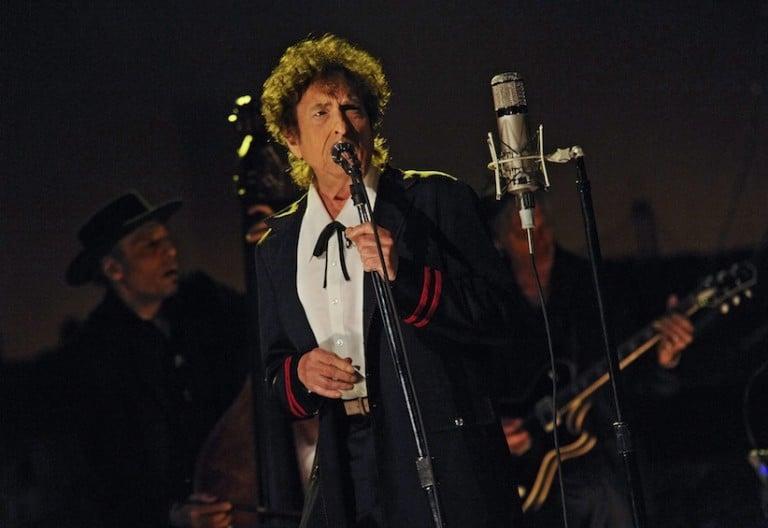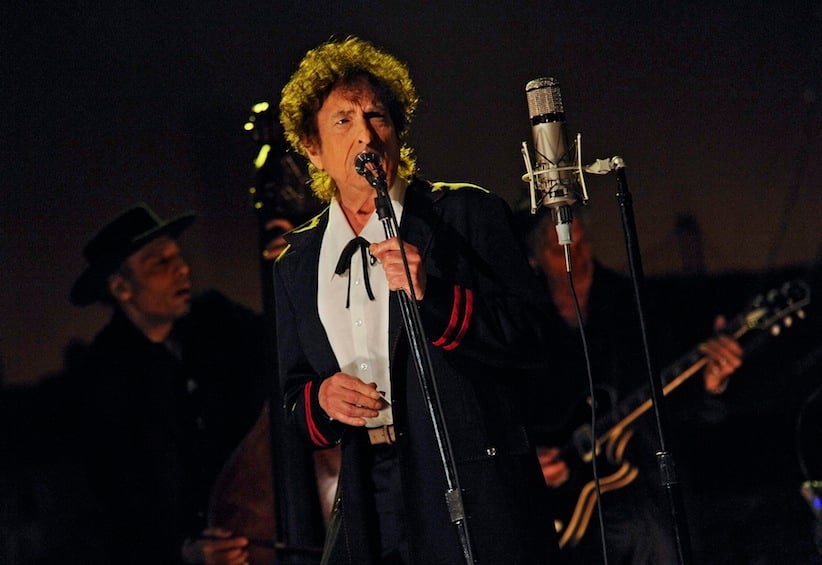Please, English teachers: don’t assign Bob Dylan lyrics
Bob Dylan’s Nobel Prize is good news—unless it brings Bob into more classrooms as mere lyrics, divorced from his songs’ musical context

In this photo provided by CBS, musical guest Bob Dylan performs on the set of the “Late Show with David Letterman,” Tuesday, May 19, 2015 in New York. (Jeffrey R. Staab/CBS via AP)
Share

The rejoicing of Bob Dylan fanatics is echoing around the world today, and, don’t get me wrong, I’m among those celebrating. But listen closely, and beneath the cheering over his Nobel Prize in Literature, you might detect a sigh, or even a groan. Who are these Swedish Academy members anyhow?
I’ll tell you who the true Dylan devotees suspect they might be: Basically a committee made up of the sort of high school English teachers who assign popular song lyrics instead of poetry. I mean the teachers who want the kids to know “they still get it,” whatever “it” might be. They want to stay—and I regret having to put it this way—forever young. For them, literature is a living thing, man, not a fusty anthology.
In that spirit, Dylan is lauded from Stockholm “for having created new poetic expressions within the great American song tradition.” Of course, that statement is absolutely correct, and perfectly suitable for quotation at the start of class, just before today’s discussion of the Biblical allusions in the assigned reading, “A Hard Rain’s a Gonna Fall.”
Anybody who has ever endured one of those pop-music-lyrics-as-the-true-poetry-of-our-times classes knows the desperate futility of the exercise. Dylan can be properly absorbed in many settings. Several spring to mind: played low in your bedroom, played loud in your parents’ basement, played over and over in your car during a long, ill-conceived nighttime drive along a poorly lit secondary road. But not in Grade 11 English class. Please, no.
It cannot be avoided, however, that Dylan’s literary linkages will be alluded to in learned tones in the wake of the Nobel announcement. He has indeed referenced Verlaine and Rimbaud in a song. He has mentioned that he found T.S. Eliot “worth reading.” When he stopped being Robert Zimmerman, he decided he liked the ring of Dylan Thomas’s given name, and so gave it to himself.
Thank goodness Dylan doesn’t really offer all that much encouragement to those who regard his lyrics as a gateway to literature. He delivered a delightfully rambling, or perhaps one should say ramblin’, speech last year on his influences, when he accepted the MusiCares Person of the Year award. “These songs of mine, they’re like mystery stories, the kind that Shakespeare saw when he was growing up,” he started. “I think you could trace what I do back that far.”
That was it, however, for graduate seminar fodder. Dylan plunged instead into arcane pop music lore, talking about labels and producers and such. He touched on the Byrds, the Turtles and Sonny & Cher, and how he was okay with the way they sweetened his songs into radio hits. He didn’t talk about poems—he talked about folk songs. “I sang a lot of ‘come all you’ songs,” he said of his formative years. “There’s plenty of them. There’s way too many to be counted.”
Dylan didn’t equivocate about his source material. “It all came out of traditional music: traditional folk music, traditional rock ‘n’ roll and traditional big-band swing orchestra music.” Here’s something that the wide-ranging lyrics of traditional folk, rock and big-band songs all have in common: They’re almost never very satisfying, just lying there helpless on the page, divorced from recordings and performances and sing-alongs.
Dylan’s songs are no different. Don’t buy any nonsense about how the words to them can profitably be read silently. The best thing about the Nobel is that it’s bound to get more people listening again to Dylan’s songs, and, even better, singing them out loud. The worst thing about the prize is that some poor misguided souls will think that, as prize-winning literature, they can be taken in straight off the page.
I suppose even that can’t hurt much. Reading his words, especially trying to turn them into classroom material, is liable to lead anyone to seek out his voice. Let’s say you’re a teacher and you’ve just failed utterly to engage your students with what you imagined was your best Dylan lecture. You retreat to the faculty lounge, where they don’t even allow smoking anymore. You pour one more cup of coffee, pop in your ear buds, and scroll on your phone to just the right song. It will, naturally, be one by the new Nobel laureate.